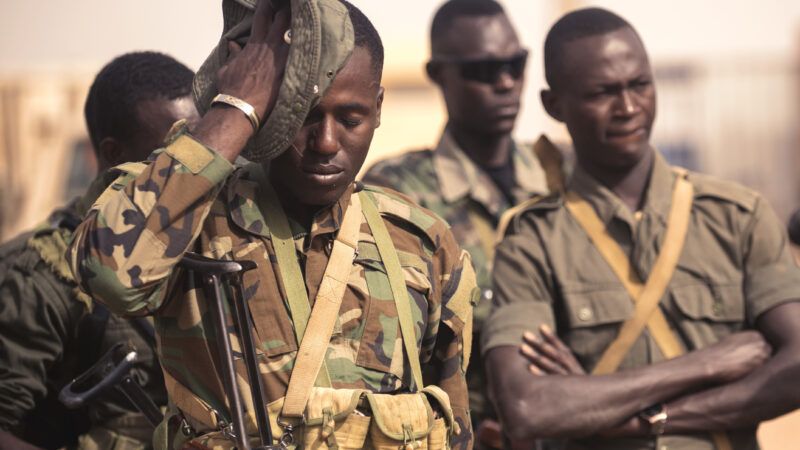America's $280 Million Military Mission in Niger Ends in Failure
The new Nigerien military government has ordered U.S. forces out of their expensive air base.

Air Base 201 in Niger was the U.S. Air Force's largest construction project in history: a massive drone center that cost American taxpayers $280 million. Thanks to a change in the Nigerien leadership, Americans may have to give up that investment for good.
Niger's new nationalist government, which took power in a coup d'etat last year, has been trying to get rid of foreign military presence in the country. Over the weekend, Nigerien Col. Amadou Abdramane ordered U.S. troops out of Air Base 201, declaring on television that "the American presence in the territory of the Republic of Niger is illegal."
The Biden administration seems to be stalling. Pentagon spokeswoman Sabrina Singh and State Department spokesman Vedant Patel both said that the United States was seeking "clarification" on the Nigerien government's comments. (What exactly is so unclear about "the American presence…is illegal"?)
The last straw seems to have been a meeting between American and Nigerien officials last week. U.S. Assistant Secretary of State for African Affairs Molly Phee criticized a Nigerien deal to sell Iran uranium, growing Nigerien-Russian military ties, and Niger's failure to return to democracy, according to The Wall Street Journal.
After the meeting, Abdramane went on television to condemn the "condescending attitude" of the Biden administration.
"Niger regrets the intention of the American delegation to deny the sovereign Nigerien people the right to choose their partners and types of partnerships capable of truly helping them fight against terrorism," he said.
The U.S. military is ostensibly in West Africa to help local governments fight against Islamist rebels, such as Al Qaeda, the Islamic State, and Boko Haram. But the problem has only gotten worse: The U.S. State Department, which reported just nine terrorist attacks throughout all of Africa in 2002 and 2003, recorded 2,737 incidents in Burkina Faso, Mali, and western Niger alone in 2022.
The U.S. presence in Niger, unknown to most Americans, has been a mess for years. In 2017, the Islamic State ambushed and killed four U.S. Green Berets. The U.S. military reprimanded several commanders for improperly preparing the troops and lying about their mission. In 2022, local bandits robbed a van carrying $40,000 in American taxpayer money, meant to pay local employees, in broad daylight just outside Air Base 201.
Many West African countries are former French colonies, and France has also used counterterrorism missions to retain its influence over the region it calls "Françafrique."
Resentment over the American and French presence boiled over in 2020, when West Africa began to suffer a series of military coups, bringing anti-Western governments to power. Ironically, many of the coup plotters—including the Nigerien officers—had also received U.S. military training before turning against their American backers.
One of those officers, Gen. Abdourahmane Tchiani, blamed the failure of such U.S. military aid for his decision to overthrow Niger's elected government.
"The current security approach has failed to secure our country, despite the heavy sacrifices made by Nigeriens and the appreciable and appreciated support of our external partners," he said in a speech shortly after seizing power. "No, the results have not lived up [to] our expectations, and we can no longer continue with the same approaches proposed to date."


Show Comments (14)